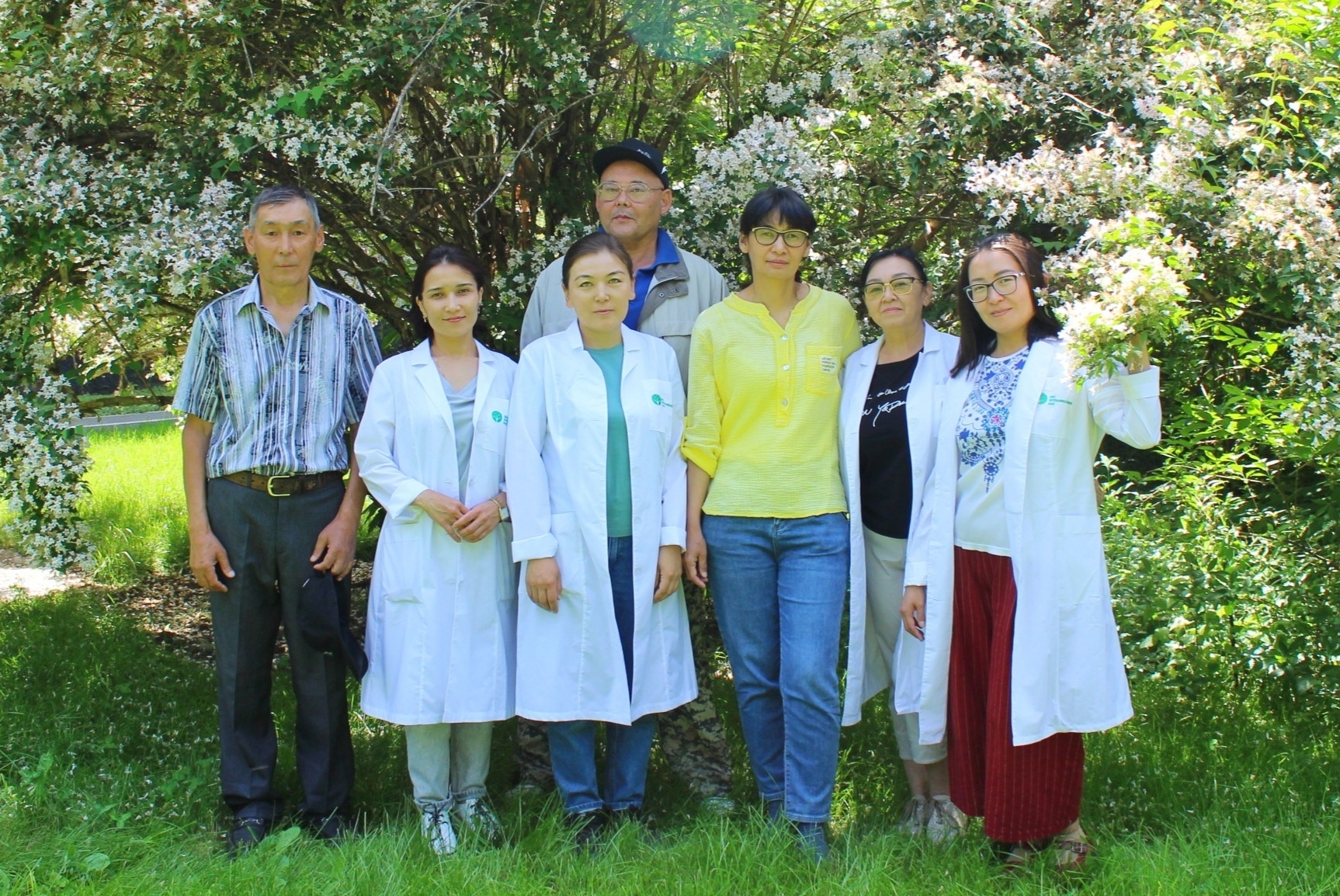Main focal areasof academic research
1. Preservation, effective restoration in nature, rational use in the cultivation of globally unique Kazakhstani species of Malus sieversii and Armeniaca vulgaris and the genetic pool of wild fruit plants.
2. Conservation ex-situ of the sampled forms of Malus sieversii and Armeniaca vulgaris and of other wild fruit plants.
3. Biochemical assessment of fruit raw materials of wild fruit plants with the view to monitoring biologically active substances and anti-oxidant activity.
4. Introduction into operation of cultivars – clones of Malus sieversii and Armeniaca vulgaris, for selection, forest restoration works, as well as for foodstuff industry of Kazakhstan.
5) Total Staff: 10
Candidates of Sciences – 1, Masters – 5, Bachelors-1
Мukanova G.S. – head of the Lab, Candidate of Biological Sciences
Akbayev А.Zh. – agricultural scientist
Sankayevayeva А.G. – junior researcher, master of biology
Shadmanova L.Sh. – junior researcher, master of biology
Кudzhabergenova Sh.N. – junior researcher, master of biology
Кidarbek Т. – junior researcher, master of biology
Маssimzhan М.Т. – junior researcher, master of biology
Smailova М.К. – junior researcher, bachelor of biology
Роziyev I. – worker cultivating fruit plants
Аbilzhanov Т. – worker cultivating fruit plants
From 2008, on recommendation of the first Lab head, PhD (Biological Sciences), professor, academic of RK NAS, Honorary Scientist of Kazakhstan A.D. Jangaliyev, G.S. Mukanova, Candidate of Biological Sciences has been the head of the laboratory of protection of genetic pool and introduction of fruit plants.
- Over 2012-2017 the lab researchers carried out the following academic projects were implemented by the lab employees:
- Introduction into production of new immune and scab resistant cultivars and forms of wild apple for juice production”;
- «Anti-oxidant activity of fruits of cultivars clones of Malus sieversii and Armeniaca vulgaris, for ensuring alimentary security of the RK”
- For introduction into manufacture of cultivars, clones of Malus sieversii of the domestic selection for juice production, we designed the chemical and technological requirements related to the fruit raw materials of 42 cultivars – clones of apples, suitable for use in the juice production. Biochemical research of fresh fruit of Malus sieversii and the products of their technological processing have demonstrated, that, based on the concentration of alimentary and biologically active substances they substantially surpass the fruit of cultured cultivars with respect to accumulating dry and pectin substances, phenol compounds, as well as other biologically substances.
- The list of cultivars of Malus sieversii suitable for the production of high quality of natural apple juice with the high values of antioxidant activities, nutrition value and safety for cultivating in raw material orchids, and possessing a set of necessary technological properties, including high juice yield.
- For identified cultivars – clones of Malus sieversii there have been produced the recommendation for selection and for obtaining high technological qualities for juice production.
- In addition to it, the lab staff participated in the implementation of two scientific and technical programmes:
- 2013-2015 Botanical diversity of wild relatives of cultured plants of Kazakhstan as a source of enrichment and preservation of genetic pool of agricultural and biological diversity for implementation of the alimentary programme”
- 2015-2017 – Sustainable management of genetic resources of the State botanical gardens of the South-eastern and central Kazakhstan – specially protected natural territories of republican importance in conditions of transition to “the green economy”.
- Academic and practical result of the listed programmes shall be the works for the conservation and replenishment of unique collection fund of the wild fruit plants of Kazakhstan:
The new core collections were created over the years 2013-2017;
- Malus sieversii (24 forms), selected from the peak of Tarbagatay;
- Malus sieversii (14 forms) selected from the mountains of the West Tyan Shan;
- Armeniaca vulgaris (10 forms) from the mountains of ZailiyskiyAlatau (Zhetyzhol peak);
- Prunus sogdiana (8 forms) from the mountains of West Tyan Shan;
- Genus Rosa represented by 8 species of dog-roses
- In the “Forest Nursery” JSC the works continue which relate to the industrial reproduction of patented 27 cultivars of clones of Malus sieversii and 16 cultivars of Armeniaca vulgaris for restoration of indigenous fruit forests of the Republic of Kazakhstan, development of selection programmes, creation of permanent database of forest seed cultivation.
The Global FAO emphasizes that in the short term the resolution of the alimentary security problem consists in the most rapid rise in the food production. In this respect, the cultivated Malus sieversii clones and clones of Armeniaca vulgaris become an attractive object of investment. The consumers, retail sellers, manufacturers of juices, fruit canned goods and children’s nutrition products have felt there is a lack of domestic fruit. Our country would be able to supply itself with fresh fruit almost all year round thanks to the introduction into the manufacture of the cultivated cultivars of clones of Malus sieversii and Armeniaca vulgaris.
It should be noted that the unique nature of the Sievers apple tree of Kazakhstan, as the stem mother of the entire global cultivar diversity has been recently confirmed by the foreign academics, engaged in selection. Herbert Audwinkle, an expert on apples at Cornell University in the US has noted that “Kazakhstani apple orchids –are unique resources for the planet and are valuable due to their resistance to illnesses”. The Kazakhstani Malus sieversii would be able to resolve not only the Kazakhstani domestic, but also the formed global problem. The clone cultivars of Malus sieversii are deemed to be an excellent raw material for obtaining juices, pectins, various types of canned products with high vitamin content. In addition to it, the fruit raw materials of Malus sieversii may become a source of obtaining low alcoholic and alcoholic beverages, such as cider and calvados, which industrial manufacture is deemed to be a profitable focal area.
In addition to it, our lab will continue research for the study, conservation and restoration in situ of wild fruit orchids of Kazakhstan, their use by cultivating ex situ, as well as the development of pomology selection programme.
